八年级英语下册 Unit 4《Why don’t you talk to your parents?》(第4课时)教案 (新版)人教新目标版
人教八年级英语下册《Unit 4 Why don't you talk to your parent
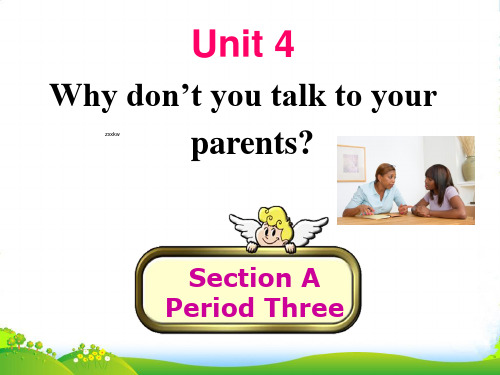
4. Kids shouldn’t play computer games until late at night. They should rest early.
◆You could do … : “你(可以) 做……” ◆ Let’s do … : “让我们做……吧!” ◆ “主语+had better (not)+动词原形” :
“……最好(不要)做某事” You’d better go to school on time. ◆ It’s best to do ... : “做……再好不过 了。”
• 3. You could save more money __s_o_t_h_a_t_ you can buy a gift for your friend’s birthday.
4. Kids shouldn’t play computer games ___u_n_t_i_l __ late at night. They should rest early.
Guess
1. H__o_w__a_b_o_u_t going out for a walk? 2. W__h__a_t _a_b_o_u_t_ another cake? 3. W__h__y_d_o_n_’_t_ you _t_u_r_n__to__ the
reference book? 4.Why _d_id_n_’_t you s_e_e_ the football match? 5.W__h_y__d_o_n_’_t _y_o_u_ go there with us? 6. W__h__y_n_o_t_ go fishing today?
人教版英语八年级下册(讲义)Unit 4 — Why don`t you talk to your parents .词句精讲精练

人教版英语八年级下册Unit 4 Why don’t you talk to your parents?词句精讲精练词汇精讲1. allowallow作动词,意为“允许”。
用法如下:(1)allow sth.意为“允许某事的发生”。
例如:I can’t allow such a thing. 我不允许发生这样的事。
(2)allow doing sth.意为“允许做某事”。
例如:We don’t allow eating in the classrooms. 我们不允许在教室吃饭。
We don’t allow smoking here. 我们不允许在此抽烟。
(3)allow sb. to do sth.意为“允许某人做某事”。
例如:Her father would not allow her to eat sweets. 她父亲不允许她吃糖果。
They don’t allow students to smoke in the classroom. 他们不允许学生在教室抽烟。
(4)allow sb. sth. 意为“给予某人某物(尤指钱或时间);让某人有(拥用或带有)某物”。
例如:He allows his son too much money. 他给他儿子的钱太多。
We’ll allow you time to answer. 我们将给你回答的时间。
2. get on withget on意为“相处,进展”,也可用get along,其后接介词with。
get on with sb. 意为“与某人和睦相处/关系良好”;get on well/badly with sth. 意为“某事进展顺利/不好”。
例如:He gets on (well) with his classmates.他和同学们相处融洽。
How do you get on with your studies?你的学业进展如何?【拓展】get on 还有“上车”的意思,后面常接bus; train等表示交通工具的词;反义词为get off。
人教版英语八年级下册Unit 4 Why don’t you talk to your parent

2019-2020学年人教版英语八年级下册Unit 4 Why don’t you talk to your parents?课文知识点总结Section A1.Why don’t you talk to your parents? 你为什么不和你打父母谈谈呢?【解析】Why don't you do sth ?= Why not do sth? 为什么不......呢?【拓展】用于提建议的句型有:(1)What about doing sth ?=How about doing sth? ….怎么样?(2)Why don’t you do sth?= Why not do sth? 为什么不呢?(3)Let’s do sth.让我们一起做某事吧。
(4)Shall we/I do sth?我们做…好吗?(5)had better do/not do sth 最好做/不做某事(6) Will/Would you please do sth 请你做…好吗?(7) Would you like to do sth? 你想去做某事吗?(8)Would you mind doing sth?你介意做某事吗?【回答】(1). 同意对方的建议时,一般用:◆Good idea./ That’s good idea. 好主意◆OK/ All right./ Great 好/ 行/太好了◆Yes, please ./ I’d love to 是的/ 我愿意◆I agree with you 我同意你的看法◆No problem 没问题◆Sure/ Of course/ Certainly 当然可以◆Yes, I think so 对,我也这样想(2).对对方的帮助或要求表示委婉谢绝时,一般用:◆I don’t think so 我认为不是这样◆Sorry, I can’t 对不起,我不能◆I’d love to, but…◆I’m afraid…我愿意,但恐怕……2.I have to study too much so I don’t get enough sleep.我要学的太多,因此我睡眠不足。
八年级英语下册 Unit 4 Why don’t you talk to your parents短语、句型、作文汇总 (新版)人教新目标版

Unit 4 Why don’t you talkto your parents?【重点单词】allow [əˈlaʊ] v. 允许,准许wrong [rɔŋ] adj. 错误的What's wrong? 哪儿不舒服?midnight ['mɪdnaɪt] n. 午夜,子夜look through 浏览,快速查看guess [ɡes] v. 猜测,估计deal [di:l] v. 处理,应付big deal 重要的事work out 成功地发展,解决get on with 和睦相处,关系良好relation [rɪˈleɪʃn] n. 关系,联系,交往communicate [kəˈmju:nikeit] v. 沟通,通信,通讯communication [kəˌmju:nɪˈkeɪʃn] n. 交流,沟通argue [ˈɑ:ɡju:] v. 争论,争吵cloud [klaʊd] n. 云elder ['eldə(r)] adj. 年级较长的instead [ɪnˈsted] adv. 代替whatever [wɒtˈevər] pron. 任何,不管什么,无论什么nervous [ˈnə:vəs] adj. 紧张不安的offer ['a:fər] v. 提供,自愿给予proper [ˈprɔpə] adj. 合适的,适当的secondly [ˈsekəndli] adv. 第二,其次explain [ɪkˈspleɪn] v. 讲解,解释,说明clear [klɪə] adj. 清晰的,清楚易懂的copy [ˈkɔpi] v. 复制return [rɪ'tɜ:n] v. 回来,返回,归还anymore ['enɪmɔ:] adv. 不再,再也不member [ˈmembə] n. 成员,会员pressure ['preʃə(r)] n. 压力compete [kəm'pi:t] v. 比赛,竞争opinion [əˈpɪnjən] n. 意见,想法,看法skill [skɪl] n. 技能,技巧typical [ˈtɪpɪkl] adj. 典型的football [ˈfʊtbɔ:l] n. 足球cut out 删去,删除quick [kwɪk] adj. 快的,迅速的continue [kənˈtɪnju:] v. 继续,连续compare [kəm'peə] v. 比较compare…with 比较,对比crazy [ˈkreɪzɪ] adj. 疯狂的,狂热的development [diˈveləpmənt] n. 发育,成长,发展cause [kɔ:z] n. & v. 原因;造成,使发生usual [ˈju:ʒuəl] adj. 通常的,平常的in one's opinion 依… 看perhaps [pəˈhæps] adv. 可能,大概,也许【重点语法】在英语中,表示建议的说法有很多,而且都是中考考查的重点。
人教版八年级英语下册《Unit4 Why don’t you talk to your parent

人教版八年级英语下册《Unit4 Why don’t you talk to your parents》教学设计(第5课时)一. 教材分析人教版八年级英语下册《Unit4 Why don’t you talk to your parents》是本单元的第五课时,主要围绕着如何向父母提出建议展开。
本课时包含两个部分:part A 和part B。
part A包含一个听力活动,一个读写任务和一个口语练习;part B包含一个读写任务和一个口语练习。
本课时旨在帮助学生掌握向父母提出建议的策略,提高他们的听说读写能力。
二. 学情分析学生在之前的学习中已经掌握了如何提出建议的基本句型“Why don’t you…?”和“You should….”,但还需要在实际情境中进行运用和提高。
此外,学生在听力、口语、阅读和写作方面需要进一步的加强和巩固。
三. 教学目标1.知识目标:(1)能够听懂、会说、会读、会写本课时所学的单词和短语。
(2)能够运用所学句型提出建议,并进行简单的交流。
2.能力目标:(1)提高学生的听力能力。
(2)提高学生的口语表达能力。
(3)提高学生的阅读和写作能力。
3.情感目标:(1)培养学生积极主动与父母沟通的习惯。
(2)培养学生珍惜友谊,关心他人的品质。
四. 教学重难点(1)掌握本课时所学的单词和短语。
(2)运用所学句型提出建议,并进行简单的交流。
(1)如何准确地运用听力技巧获取信息。
(2)如何准确地运用阅读技巧获取信息。
五. 教学方法1.任务型教学法:通过完成各种任务,激发学生的学习兴趣,提高学生的学习积极性。
2.情境教学法:通过设定真实的情境,让学生在实际情境中学习和运用英语。
3.交际型教学法:通过小组讨论、角色扮演等方式,培养学生的交际能力。
六. 教学准备1.教材:人教版八年级英语下册《Unit4 Why don’t you talk to your parents》。
2.课件:根据教学内容制作的课件。
人教目标版八年级下册Unit4 Why don’t you talk to your parents

If you’re Linda Miller. Tell us your opinion about after-school classes.
I don’t really agree that children should take after-school classes. I think(In my opinion, )it’s crazy/unfair for children to…. I believe it is better if parents …. People shouldn't....
Why don’t they let their kids be kids?
7. 医生们说太多的压力不利于孩子们的成长。
Doctors say too much pressure is not good for a child's development.
8. 所有这些活动会给孩子们导致很大的压力。
Unit 4 Why don’t you talk to
your parents? Period5
1. 家庭成员 2. 独自消磨时光 3. 给某人那么多的压力 4. 与某人竞争 5. 取得更好的成绩 6. 业余活动 7. 互相
family members spend time alone give sb. so much pressure compete with sb. get better grades free time activities each other
The most common activity I want to do is that …
期末Unit4Whydon‘tyoutalktoyourparents?知识点人教版八年级英语下册
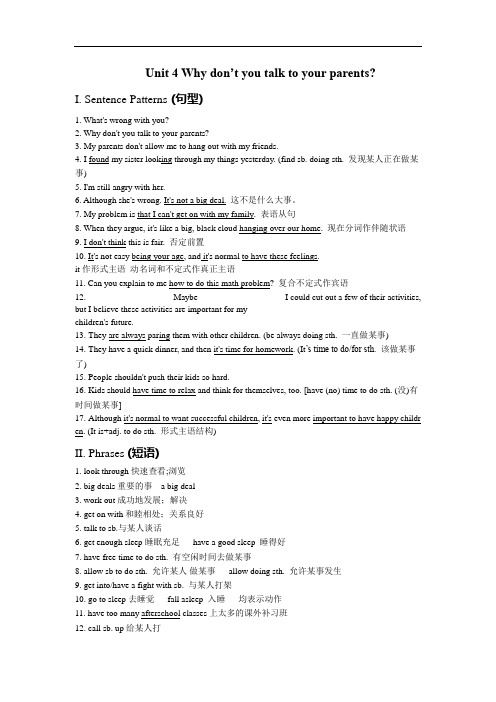
Unit 4 Why don’t you talk to your parents?I. Sentence Patterns (句型)1. What's wrong with you?2. Why don't you talk to your parents?3. My parents don't allow me to hang out with my friends.4. I found my sister looking through my things yesterday. (find sb. doing sth. 发现某人正在做某事)5. I'm still angry with her.6. Although she's wrong. It's not a big deal. 这不是什么大事。
7. My problem is that I can't get on with my family. 表语从句8. When they argue, it's like a big, black cloud hanging over our home. 现在分词作伴随状语9. I don't think this is fair. 否定前置10. It's not easy being your age, and it's normal to have these feelings.it作形式主语动名词和不定式作真正主语11. Can you explain to me how to do this math problem? 复合不定式作宾语12. Maybe I could cut out a few of their activities, but I believe these activities are important for mychildren's future.13.They are always paring them with other children. (be always doing sth. 一直做某事)14.They have a quick dinner, and then it's time for homework. (It’s time to do/for sth. 该做某事了)15.People shouldn't push their kids so hard.16.Kids should have time to relax and think for themselves, too. [have (no) time to do sth. (没)有时间做某事]17.Although it's normal to want successful children, it's even more important to have happy childr en. (It is+adj. to do sth. 形式主语结构)II. Phrases (短语)1. look through 快速查看;浏览2. big deals重要的事 a big deal3. work out成功地发展;解决4. get on with和睦相处;关系良好5. talk to sb.与某人谈话6. get enough sleep睡眠充足have a good sleep 睡得好7. have free time to do sth. 有空闲时间去做某事8. allow sb to do sth. 允许某人做某事allow doing sth. 允许某事发生9. get into/have a fight with sb. 与某人打架10. go to sleep 去睡觉fall asleep 入睡均表示动作11. have too many afterschool classes上太多的课外补习班12. call sb. up给某人打13. on the phone在中14. so that 以便,为了/ in order that后接句子15. give sth. back to sb. 把某物归还给某人= return sth. to sb.16. forget about sth. 忘记某事7. hang over... 笼罩在…...18. be nice/friendly to sb. 对某人友好19. until late at night直到深夜20. refuse to do sth. 拒绝做某事21. let sb. do sth. 让某人做某事22. talk about sth. with sb. 与某人谈论某事23. offer to do sth.主动做某事24. municate with sb. about sth. 与某人交流某事= have munication with sb. about sth.25. be afraid of doing sth.害怕做某事be afraid to do sth. (因为害怕某结果而)不敢做某事26. cut out删除;删去27. pare...with... 把.......作比较;对比28. in one’s opinion.....依…看29. spend time alone独自消磨时光30. a lot of pressure/stress许多压力31. free time activities业余活动32. the mon problem普遍问题33. give one's opinion about sth. 就某事给出某人的观点33. be important for sb./sth. 对......重要34. not .. until...直到……才……35. have a quick dinner很快吃完晚饭36. know/learn about了解37. send sb. to... 派某人.....38. push sb. so hard逼迫某人太紧39. too much pressure太多的压力40. think for oneself为某人自己着想41. keep on doing sth.一直做某事42. worry about担心= be worried about43. differences and similarities不同点和相似点44. pete with sb. 与某人竞争45. cause a lot of stress for sb. 给某人造成很多压力III. Grammar (语法)一.情态动词should, could1.相同点:二者都是情态动词,无人称和数的变化,后加动词原形。
Unit4Whydon'tyoutalktoyourparents_短语突破人教版英语八年级下册
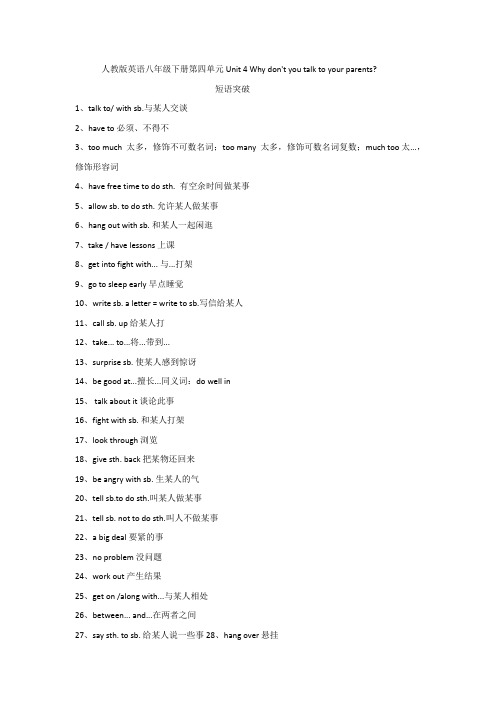
人教版英语八年级下册第四单元Unit4Why don't you talk to your parents?短语突破1、talk to/with sb.与某人交谈2、have to必须、不得不3、too much太多,修饰不可数名词;too many太多,修饰可数名词复数;much too太...,修饰形容词4、have free time to do sth. 有空余时间做某事5、allow sb.to do sth.允许某人做某事6、hang out with sb.和某人一起闲逛7、take/have lessons上课8、get into fight with...与...打架9、go to sleep early早点睡觉10、write sb.a letter=write to sb.写信给某人11、call sb.up给某人打12、take...to...将...带到...13、surprise sb.使某人感到惊讶14、be good at...擅长...同义词:do well in15、talk about it谈论此事16、fight with sb.和某人打架17、look through浏览18、give sth.back把某物还回来19、be angry with sb.生某人的气20、tell sb.to do sth.叫某人做某事21、tell sb.not to do sth.叫人不做某事22、a big deal要紧的事23、no problem没问题24、work out产生结果25、get on/along with...与某人相处26、between...and...在两者之间27、say sth.to sb.给某人说一些事28、hang over悬挂29、be nice to sb.对某人友好30、refuse to do sth.拒绝做某事31、feel lonely感到孤独。
八年级英语下册 Unit 4 Why don't you talk to your parents作

“我的妈妈……杂志……”可知look through符合句意。因此答案选
B。
11.We should learn how to ________ well with people around us. A.get along B.get down
C.get to D.get up
A 【解析】get along (well)with sb.为固定搭配,意为“和某人相
果”;even if意为“尽管”;if only意为“只要;但愿”。根据句意
“他说的很清楚……每个人都理解他说的意思”可知so that 符合句 意。因此答案选B。
13 . He speaks ________ English ________ French.Instead , he speaks German. A.either;or B.not only;but also C.both;and D.neither;nor D 【 解 析 】either...or... 意 为 “ 或 者 …… 或 者 ……” ; not
so 意为“因此”;if意为“如果”。根据句意“法兰克过着简朴的
生活……他有很多钱”可知although符合句意。因此答案选A。
9.—May I borrow this book?
—Of course,please ________ it in two weeks. A.turn B.return C.give D.delete
处(得好)”;get to意为“到达”;get up意为“起来;起床”;get
down意为“下来”,因此答案选A。
12.He spoke clearly ________ everybody understood him. A.so far B.so that C.even if D.if only B 【解析】so far意为“到目前为止”;so that意为“以便;结
八年级英语下册 Unit 4 Why don’t you talk to your parents

八年级英语下册Unit 4 Why don’t you talk to your parents Section B(第5课时)说课稿一. 教材分析八年级英语下册Unit 4 Why don’t you talk to your parents Section B(第5课时)主要讲述了如何向父母提出建议以及如何倾听父母的意见。
通过本节课的学习,学生能够掌握情态动词can的用法,学会如何用英语表达自己的观点和意见,提高口语交际能力。
二. 学情分析八年级的学生已经具备一定的英语基础,对于情态动词的用法有一定的了解。
但在实际应用中,部分学生可能会存在发音不准确、词汇搭配不当等问题。
此外,学生在家庭生活中可能很少有机会与父母用英语交流,因此,如何在课堂上创设真实语境,激发学生的学习兴趣和积极性,是本节课需要解决的问题。
三. 说教学目标1.知识目标:学生能够掌握情态动词can的用法,学会如何向父母提出建议以及如何倾听父母的意见。
2.能力目标:学生能够在实际情境中运用所学知识进行口语交际,提高英语口语表达能力。
3.情感目标:培养学生尊重父母、理解父母的良好品质,增强家庭情感交流。
四. 说教学重难点1.重点:情态动词can的用法以及如何向父母提出建议。
2.难点:如何正确运用情态动词can进行口语交际,以及在实际情境中灵活运用所学知识。
五. 说教学方法与手段1.采用任务型教学法,以学生为主体,引导学生主动参与课堂活动。
2.运用情境教学法,创设真实语境,让学生在实践中学会运用所学知识。
3.采用分组合作学习,培养学生的团队协作能力和沟通能力。
4.利用多媒体教学手段,如图片、视频等,丰富教学内容,提高学生的学习兴趣。
六. 说教学过程1.导入:以一幅家庭场景的图片引导学生谈论家庭成员之间的关系,引出本节课的主题。
2.新课呈现:通过展示一段关于家庭成员之间建议和意见的视频,让学生了解情态动词can的用法。
3.语法讲解:讲解情态动词can的用法,引导学生掌握如何向父母提出建议。
英语人教版八年级下册Unit4_Why_don't_you_talk_to_yo
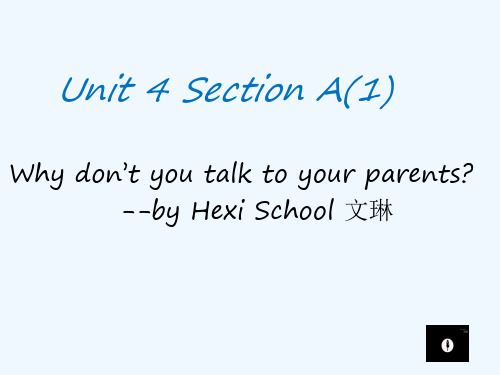
I have too much homework.
What’s wrong?
.
Why don’t you talk to your friends?
I got into a fight withnd circle the problems you hear in 1a.
Unit 4 Section A(1)
Why don’t you talk to your parents? --by Hexi School 文琳
Talk about problems or troubles讨论困难和麻烦 Give advice 提供建议
What’s the matter with the boy? =What’s wrong with the boy?
What’s wrong?
after-school classes. I have too many ____________________ 补习班
What’s wrong?
with my best friend. get into a fight with sb =have a fight with sb.
Pair work
Look at the problems in 1a.
Task One: 六个宝盒里有五个等待解决的问题,看看 哪一个小组提出的建议最多最合理?
1
2
3
4
5
I can’t get good grades.
I am not strong.
I am not good at math.
got into a fight I ___________
REVIEW
• • • • • • Study too much 学习任务重 enough sleep 充足睡眠 too much homework 太多家作 hang out with friends 和朋友出去玩 after-school classes 课后辅导 get into a fight 争吵
人教版八年级英语下册集体备课教案:Unit4 Why don’t you talk to your

课题课时Period 1教学目标语言技能听:能听懂他人他人陈述困难和麻烦的简单对话的内容,并获取主要信息。
说:1.能询问、陈述自己或他人的困难和麻烦,如What’s wrong?I’m really tired because I studied until midnight last night.2.能针对别人的困境提出解决的办法和建议,如What should Ido?Well,you should call him so that you can say you’re sorry.语言知识语音:熟练把握邀请句的升调语调,同时,在口语交流时能做到语音、语调准确、自然、流畅。
词汇:1.熟练运用:allow,wrong,midnight,guess,de al.2.掌握:What’s wrong, look through,work out.语法:1.能正确使用情态动词could,should表达或劝告,如:Youcould go to his house.2.能正确使用Why don’t you...?句型表达建议。
功能:学会询问、陈述自己或他人的困难和麻烦。
话题:了解人际交往的相关知识。
情感态度1.培养学生用英语交际能力,学会与人进行流畅的沟通和交流;2.使学生在活动中学会真诚、坦然地与人交谈。
学习策略认知策略:能在具体的情境中询问、陈述自己或他人的困难和麻烦,从而进一步主动练习和实践。
调控策略:.能针对别人的困境提出解决的办法和建议,并与人进行交流。
交际策略:培养学生合作能力,不断完善知识点,加强对话练习,学会与人闲聊,进行交流。
资源策略:通过多媒体、录音机等教学辅助工具。
文化意识了解中西方家长对待孩子参加课外活动和课外学习班的态度与做法。
教学重难点教学重点1.能正确使用情态动词could,should表达或劝告。
2.能正确使用Why don’t you...?句型表达建议。
教学难点1.Talk about problems.2.Give advice.教学方法听说法,交际法,教学辅助手段PPT, recorder.板书设计Unit4 Why don’t you talk to your parents?Sectio n A 1a-2dallow What’s wrong?wrong Why don’t you...?midnightguessdeal教后反思本节课学会了提建议的方式有:Why don’t you...? /Why not…?等Teaching ProcedureStages/TimingStep 1. warming-upStep 2 PresentationStep3 DiscussionStep 4Pre sentationStep 5 ListeningTeach ers’ a ctivitiesAfter greeting, ask students :What day is it today?What’s the date today?What’s the weather like today?1. Show the picture of a girl:T: Please look at this girl,what isshe doing?T: Look at her face,she isworried.because she has a lotof homework to do.Do yo uhave too much homework todo?Do you think it is serious?1a.Get them to read the followingsentences and discuss wheatherthey are serious or not. And thenwrite them in the approprite boxT:Do you have theseproblems?What kind of problemsdo you have?Students’ activitiesStudents answer the questions。
人教版 八年级英语 下册 unit4_Why_don't_you_talk_to_your
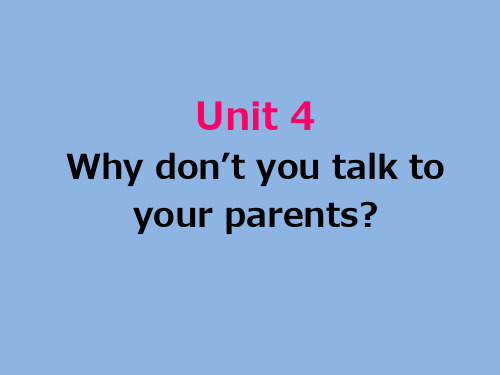
Serious
1, 2, 5
Not serious
3, 4
1b Listen and circle the problems you hear in 1a.
1. I have to study too much so I don’t get enough sleep.
2. I have too much homework so I don’t have any free time to do things I like.
I agree/disagree with his advice because…
I agree with his advice because lack of communication can cause a lot of problems in our daily life. So we should always communicate with people more.
B: _st_a_y__h_e_a_l_t_h_y______. OK, I’ll try to ______ them agTahina.t’s a good idea
talk to
Pair work
1c Look at the problems in 1a and make conversations.
To learn to talk about problems To learn to give advice To learn new words: allow, wrong, guess, deal, relation, communication, argue, cloud, elder, instead, whatever, nervous, offer, proper, secondly, explain, clear…
八年级下册Unit 4 Why don't you talk to your parents
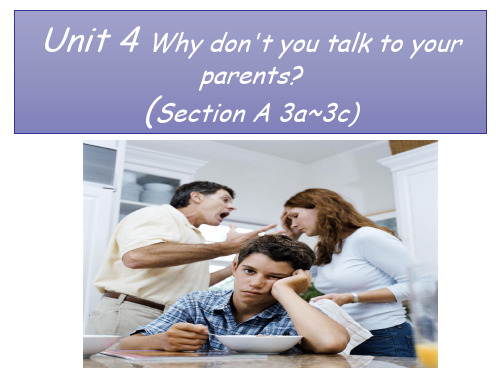
Let's check together!
get enough sleep 得到足够的睡眠 have too much homework有太多的家庭作业 have free time 有业余时间 allow sb to do sth 允许某人去做某事 too many after-school classes太多的课外学习班 get into a fight with sb 与某人吵架/打架
and nervous. Is that normal? What can I do?
D.He hSaadsasnod Tmhirateneyn after-school activities.
Read letter 1 and complete the mind-map 1. (先独立完成,再小组核对/按号抢答,小组接力法retell展示)
What's the boy's problem?
He has too much homework.
What's wrong with the girl?
she got into a fight with her friend.
What happened to the girl?
She has too many after-school classes.
(先独立完成,后小组主持法核对,小组接力展示。)
Advice?
版新目标八年级下册英语unit4-why-don't-you-talk-to-your-parents重点知识讲解
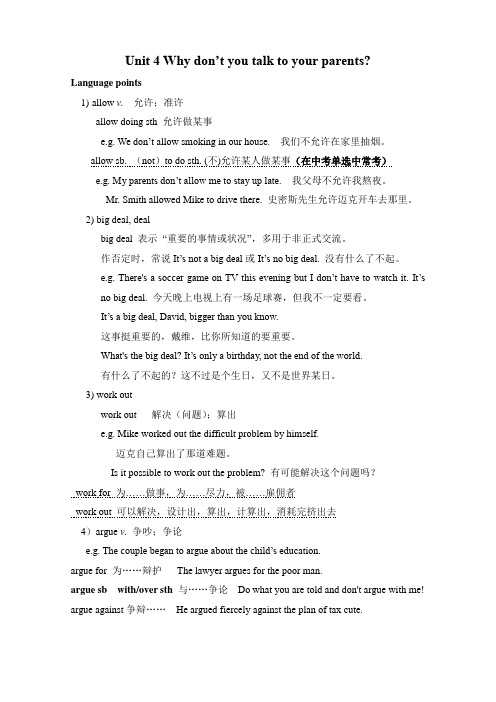
Unit 4 Why don’t you talk to your parents?Language points1)allow v. 允许;准许allow doing sth 允许做某事e.g. We don’t allow smoking in our house. 我们不允许在家里抽烟。
allow sb. (not)to do sth. (不)允许某人做某事(在中考单选中常考)e.g. My parents don’t allow me to stay up late.我父母不允许我熬夜。
Mr. Smith allowed Mike to drive there. 史密斯先生允许迈克开车去那里。
2) big deal, dealbig deal 表示“重要的事情或状况”,多用于非正式交流。
作否定时,常说It’s not a big deal或It’s no big deal.没有什么了不起。
e.g. There's a soccer game on TV this evening but I don’t have to watch it.It’sno big deal. 今天晚上电视上有一场足球赛,但我不一定要看。
It’s a big deal, David, bigger than you know.这事挺重要的,戴维,比你所知道的要重要。
What's the big deal? It’s only a birthday, not the end of the world.有什么了不起的?这不过是个生日,又不是世界某日。
3) work outwork out 解决(问题);算出e.g. Mike worked out the difficult problem by himself.迈克自己算出了那道难题。
Is it possible to work out the problem? 有可能解决这个问题吗?work for 为……做事,为……尽力,被……雇佣者work out 可以解决,设计出,算出,计算出,消耗完挤出去4)argue v. 争吵;争论e.g. The couple began to argue about the child’s ed ucation.argue for 为……辩护The lawyer argues for the poor man.argue sb with/over sth 与……争论Do what you are told and don't argue with me! argue against争辩……He argued fiercely against the plan of tax cute.5). proper adj.正确的;恰当的e.g. It’s not proper to visit a friend too late in the evening.太晚了,去看朋友不合适。
人教版英语八年级下册Unit 4 Why don’t you talk to your parents课文知识点总结
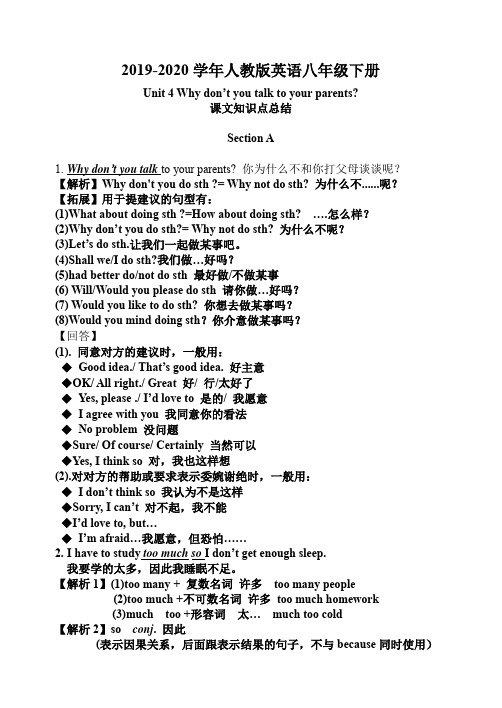
2019-2020学年人教版英语八年级下册Unit 4 Why don’t you talk to your parents?课文知识点总结Section A1.Why don’t you talk to your parents? 你为什么不和你打父母谈谈呢?【解析】Why don't you do sth ?= Why not do sth? 为什么不......呢?【拓展】用于提建议的句型有:(1)What about doing sth ?=How about doing sth? ….怎么样?(2)Why don’t you do sth?= Why not do sth? 为什么不呢?(3)Let’s do sth.让我们一起做某事吧。
(4)Shall we/I do sth?我们做…好吗?(5)had better do/not do sth 最好做/不做某事(6) Will/Would you please do sth 请你做…好吗?(7) Would you like to do sth? 你想去做某事吗?(8)Would you mind doing sth?你介意做某事吗?【回答】(1). 同意对方的建议时,一般用:◆Good idea./ That’s good idea. 好主意◆OK/ All right./ Great 好/ 行/太好了◆Yes, please ./ I’d love to 是的/ 我愿意◆I agree with you 我同意你的看法◆No problem 没问题◆Sure/ Of course/ Certainly 当然可以◆Yes, I think so 对,我也这样想(2).对对方的帮助或要求表示委婉谢绝时,一般用:◆I don’t think so 我认为不是这样◆Sorry, I can’t 对不起,我不能◆I’d love to, but…◆I’m afraid…我愿意,但恐怕……2.I have to study too much so I don’t get enough sleep.我要学的太多,因此我睡眠不足。
人教版八年级英语下册Unit 4 Why don't you talk to your parent

Unit 4 Why don’t you talk to your parents 一、重点短语1.do sports 做运动2.talk to parents 和父母交谈3.spend time alone单独度过; 独自消磨时光4. be afraid of害怕5. have a fight with sb. 与某人吵架6.get into a fight with sb. 与某人吵架/打架7. compete with sb. 与某人竞争8. get better grades取得更好的成绩9. so that 以致; 以使, 以便10. call sb. up打电话给某人11. surprise sb. 使某人感到吃惊12. cut out 删除13. compare with与…比较:对比14. not… until 直到……才15. It’s time for 是时候做…16. worry about sth. 担心某事17. look for寻找18. talk about谈论;讨论19. argue with sb. 与…争吵20. spend…on 在…上花费21. get on with sb. 和某人相处22. work out 成功地发展:解决23. too many太多24. allow sb. to do sth. 允许某人做某事25. have free time有空闲时间26. after- school classes课外活动课27.until midnight直到半夜28. study too much学得过多29. get enough sleep有足够的睡眼30. write sb. a letter给某人写信31.look through翻看; 浏览32.be angry with sb. 生某人的气33.a big deal重要的事34. fight a lot经常吵架/打架35.hang over 笼罩36. refuse to do sth. 拒绝做某事37. offer to do sth. 主动提出做某事38.mind sb. doing sth. 介意某人做某事39. all the time 一直40. in future今后41. make sb. angry使某人生气42. copy one’ s homework 抄袭某人的作业43. be oneself做自己44.family members 家庭成员45. give sb. pressure 给某人施压46. free time activities业余活动47.give one’ s opinion 提出某人的观点48. learn exam skills 学习应试技巧49. practice sports 体育训练50. cause stress 造成压力二、重点词汇讲解1. get on with=get on意为“相处,进展”,也可用get along,其后接介词with。
八年级英语下册Unit4Whydon’tyoutalktoyourparents-知识点整理
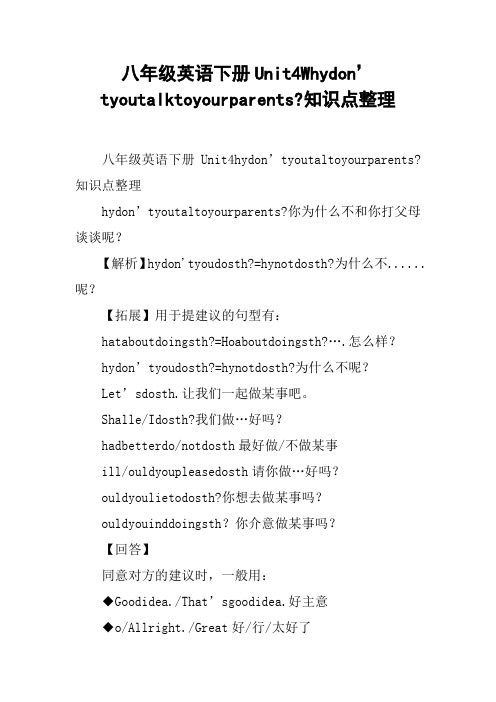
八年级英语下册Unit4Whydon’tyoutalktoyourparents?知识点整理八年级英语下册Unit4hydon’tyoutaltoyourparents?知识点整理hydon’tyoutaltoyourparents?你为什么不和你打父母谈谈呢?【解析】hydon'tyoudosth?=hynotdosth?为什么不......呢?【拓展】用于提建议的句型有:hataboutdoingsth?=Hoaboutdoingsth?….怎么样?hydon’tyoudosth?=hynotdosth?为什么不呢?Let’sdosth.让我们一起做某事吧。
Shalle/Idosth?我们做…好吗?hadbetterdo/notdosth最好做/不做某事ill/ouldyoupleasedosth请你做…好吗?ouldyoulietodosth?你想去做某事吗?ouldyouinddoingsth?你介意做某事吗?【回答】同意对方的建议时,一般用:◆Goodidea./That’sgoodidea.好主意◆o/Allright./Great好/行/太好了◆yes,please./I’dloveto是的/我愿意◆Iagreeithyou我同意你的看法◆Noproble没问题◆Sure/ofcourse/certainly当然可以◆yes,Ithinso对,我也这样想对对方的帮助或要求表示委婉谢绝时,一般用:◆Idon’tthinso我认为不是这样◆Sorry,Ican’t对不起,我不能◆I’dloveto,but…◆I’afraid…我愿意,但恐怕……【XX天津4】35.—hynotgotoLaoSheTeahousetonight?—______.A.Itdoesn'tatterB.Thanyouc.SorrytohearthatD.Soundsg reat【XX广东广州4】25.—Ifeelreallytired.—______A.Lucyyou!B.you’dbetterorharder.c.congratulations!D.hynotgoandhavea rest?【XX四川凉山3】37.—It’saniceday,isn’tit?—yes.______goinghiingandrelaxourselves?A.hynotB.hydon’tc.hatabout【XX湖南益阳】youlootootired.hynot_____arest?A.StoptohaveB.tostop havingc.stophavingIhavetostudytoouchsoIdon’tgetenoughsleep.我要学的太多,因此我睡眠不足。
- 1、下载文档前请自行甄别文档内容的完整性,平台不提供额外的编辑、内容补充、找答案等附加服务。
- 2、"仅部分预览"的文档,不可在线预览部分如存在完整性等问题,可反馈申请退款(可完整预览的文档不适用该条件!)。
- 3、如文档侵犯您的权益,请联系客服反馈,我们会尽快为您处理(人工客服工作时间:9:00-18:30)。
Unit4 Why don’t you talk to your parents一、教学目标:1. 语言知识目标:1) 能掌握以下单词:member, pressure, compete, opinion, skill, typical, football, cut out, continue, compare, compare…with, crazy, push, development, cause, usual2) 能掌握以下句型:① I think Wei Ming should…② Although you may be…, you should talk to them.③ Life shouldn’t just be about …④ Why don’t they just let their kids be kids?⑤ Although it’s normal to want successful children, it’s even more important to have happy children.2. 情感态度价值观目标:了解中国及一些其他国家中学生们普通存在的生活及学习上问题,了解别人的生活现状及他们苦恼,知道学习知识是很重要的事情,但它并不是生活的全部。
二、教学重难点1. 教学重点:1) 掌握本课时出现的生词及用法。
2) 进行听力训练,提高综合听说能力。
3)阅读短文,获得相关信息,提高学生们的综合阅读能力。
2. 教学难点1. 听力训练2. 阅读2b部分的短文并完成相关要求。
三、教学过程Step 1 Revision1. Daily greeting.2. 复习提建议的表达方式,并完成相关任务。
3. Check the homework. Let some Ss give advice.Step 2 Warming up1. T: Show a picture of student.—What’s wrong with the girl?—She’s too stressed out.—What should she do? Can you give her some advice?2. Ss discuss the problem and give some advices:e.g.S1: Why not hang out with her friends.S2: She could play sports.S3: She could play computer games.S4: She should listen to music and read some books.Step 3 WritingWork on 1b1. Ask one student re ad the sentences in 1a. Explain some main sentences.2. What activities do you like to help lower your stress? Order them from 1-8 with being the most favorite thing you do to lower stress.3. Ss discuss with their desk mates then order them.4. Let some Ss say their answersStep 4 TalkingLet some Ss talk about their answers.S1: I always hang out with my friends to lower stress.S2: I like to listen to music to lower stress best.Step 5 ListeningWork on 1c:1. Tell Ss to read the sentences 1c first.2. Play the recording for the Ss. Ss just listen for the first time. Play the recording again and check the problems Wei Ming talks about.3. Check the answers:Work on 1d:1. Let Ss read the sentences in 1d first. Tell Ss to listen again and fill in the blanks.2. Play the recording again for the Ss to listen and write.3. Ss listen to the recording carefully and try to write the words in the blanks.4. Check the answers with the class.Step 6 Pair work1. Work in pairs. Suppose your partner is Wei Ming. You try to tell her some advice and say why.2. Let two students make a model for the Ss.3. Ss practice their conversations4. Teacher can walk around the classroom, and give some help to the Ss.Step 7 Thinking1. T: There are some after-school activities. What activities do you and yourclassmates usually do? Check them.2. Ss check the activities they usually do.3. Ask some Ss say their choices.Step 8 ReadingWarming upWhat did you do after school?Do you have stress in your life?How do you relax yourself?Fast Reading1. T: Now let’s work on 2b. First, let’s read the questions and make sure we knowthe meanings of all the questions. Then read the passage quickly and find the answers to the questions.1) What is the common problem for Chinese and American families?2) Who gives their opinions about the problems?2. Ss read the letter quickly and try to find the answers to the two questions.3. Check the answers with the class.Careful Reading1. T: Now let’s read these sentences about the letter. Read the passage again. Judgeif the sentences are True or False. Please underline under the main sentences.1) Chinese children have to take so many after-school classes on weekends thesedays.2) Cathy Taylor really wants her three children to be successful, so she believesthese after-school activities are important for them.3) Linda Mi ller thinks parents should send their small kids to all kinds of classes.4) Linda thinks some parents push their kids too much.5) Alice thinks kids shouldn’t have time to relax and think for themselves2. Ss read the letter again and judge the sentences.3. Check the answers with the class.Post readingWork on 2c1. Now look at the words in bold in the article. Can you guess their meanings? Try to match them with the meaning below.2. Let Ss read and try to match the words.3. Give Ss some advice on how to do it.4. Check the answers with the Ss.5. Give some explanation about the difficult words.Work on 2d1. Tell Ss to read the passage again and answer these questions below.1) Does Cathy Taylor think it’s important for kids to join after school activities?2) Does Linda Miller agree with Cathy? What’s her opinion?3) Does Dr. Green agree with Cathy or Linda? What does she say?2. Ss work by themselves.3. Check the answers together.Homework1. Read the article again after school.2. Write a short passage a bout Cathy’s daily life and her opinions about the education of the kids.。
